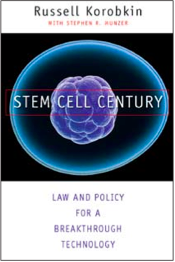 Continuing in its tradition of convening leading experts from a wide range of fields and perspectives, HSCI invited Russell Korobkin, JD, Professor of Law at UCLA and Visiting Professor at Harvard Law School, to engage panelists in ethics, law, philosophy and science to discuss his book Stem Cell Century: Law and Policy for a Breakthrough Technology. Held in partnership with Harvard Law School’s Petrie-Flom Center for Health Law Policy, Biotechnology and Bioethics, the event was moderated by Brock Reeve, Executive Director of HSCI, and featured remarks by the book’s author and discussants Kevin Eggan, PhD, Assistant Professor of Molecular and Cellular Biology at Harvard, Frances Kamm, PhD, Professor of Philosophy at Harvard and Littauer Professor of Philosophy and Public Policy at the Kennedy School of Government, and Pamela Samuelson, JD, Professor of Law and Information at UC Berkeley and Visiting Professor of Law at Harvard Law School. C-Span BookTV covered the event for national broadcast.
Continuing in its tradition of convening leading experts from a wide range of fields and perspectives, HSCI invited Russell Korobkin, JD, Professor of Law at UCLA and Visiting Professor at Harvard Law School, to engage panelists in ethics, law, philosophy and science to discuss his book Stem Cell Century: Law and Policy for a Breakthrough Technology. Held in partnership with Harvard Law School’s Petrie-Flom Center for Health Law Policy, Biotechnology and Bioethics, the event was moderated by Brock Reeve, Executive Director of HSCI, and featured remarks by the book’s author and discussants Kevin Eggan, PhD, Assistant Professor of Molecular and Cellular Biology at Harvard, Frances Kamm, PhD, Professor of Philosophy at Harvard and Littauer Professor of Philosophy and Public Policy at the Kennedy School of Government, and Pamela Samuelson, JD, Professor of Law and Information at UC Berkeley and Visiting Professor of Law at Harvard Law School. C-Span BookTV covered the event for national broadcast.
In presenting his book, Russell Korobkin broached many issues often associated with stem cell research, including the moral and legal status of the embryo, informed consent, patent law and intellectual property protection, and compensation for human tissue and gamete donation.
According to Korobkin, two basic questions drive the trajectory of Stem Cell Century: “how do we maximize the likelihood that stem cell research and regenerative medicine will achieve their full therapeutic potential, and how do we balance that worthy goal against other moral and ethical values with which it might come into conflict?” By identifying “the most important, interesting, and salient legal issues,” and “describing the current state of the law,” Stem Cell Century aims to “offer a critical assessment of the law and proposals for optimal policy.”
Korobkin pointed out that whichever side you take on these issues, federal and state policies and laws are logically inconsistent and do not line up with any one ethical or moral philosophy. Even the twice vetoed Stem Cell Research Enhancement Act introduces inconsistencies because it would allow research using discarded embryos created in fertility clinics, but not on embryos created for research. Compensation laws for women donating oocytes (eggs) are also inconsistent: in many states, women may be compensated for donating oocytes to fertility clinics, but not to research labs. “Medical researchers are held to a different ethical standard than fertility clinics with no logical justification in my opinion,” said Korobkin.
Frances Kamm cut through many of Korobkin’s arguments about the moral equivalence of embryos and consistency in public policy and laws. It’s not that she disagreed with him, Kamm said, “This is what philosophers always say ‘I love your conclusion, but please give me an argument that I can also love.’” Kamm put Korobkin’s arguments under a microscope and using a different rationale came up with the same result – support research.
Pamela Samuelson provided an overview of how patents and licensing should be set up to balance incentives for innovation, access to technology, and the desire of state governments to see a return on their investment.
Kevin Eggan gave the audience a view from the lab bench on how current policies are affecting his work. Eggan noted that the difficulty in bringing in egg donors who are not compensated for their trouble denies him one of the most important tool-kits that he can use in the search for a cure. By transferring the nucleus from a cell of a diseased individual into a donor oocyte, he can create a renewable supply of cells that mimic the disease. With those cells he can study molecular pathways and the effects of drugs. “It’s like having a flight box recorder,” he said, “where you can actually pick apart everything that happens when something goes wrong. Without eggs, without funding, it’s like flying without the recorder. We may be fine now, but will we be safer and healthier in the future?”
